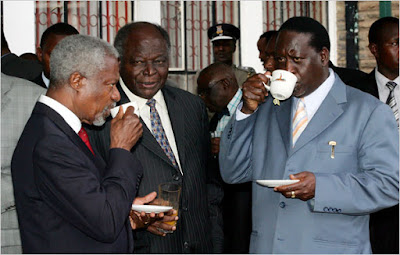
 NAIROBI, Kenya. Jan. 31st. (Time) — An opposition lawmaker was gunned down by a police officer Thursday in the second fatal shooting of an opposition legislator this week amid ethnic fighting sparked by Kenya's disputed presidential election, officials said. National police chief Hussein Ali said lawmaker David Too was killed in "a crime of passion." The opposition said it was an assassination plot. Henry Kosgie, an official of the opposition Orange Democratic Movement, told a news conference that witnesses had reported seeing Too shot as he traveled by car from Nairobi to the western city of Eldoret. Angry residents of Eldoret marched on the police station after the shooting but ran away as paramilitary officers fired into the air. Within minutes of the news reaching the western town of Kisumu, an opposition stronghold, gangs of men armed themselves with machetes and set up burning barricades. Businesses shut down and workers began to flee from the town center.
NAIROBI, Kenya. Jan. 31st. (Time) — An opposition lawmaker was gunned down by a police officer Thursday in the second fatal shooting of an opposition legislator this week amid ethnic fighting sparked by Kenya's disputed presidential election, officials said. National police chief Hussein Ali said lawmaker David Too was killed in "a crime of passion." The opposition said it was an assassination plot. Henry Kosgie, an official of the opposition Orange Democratic Movement, told a news conference that witnesses had reported seeing Too shot as he traveled by car from Nairobi to the western city of Eldoret. Angry residents of Eldoret marched on the police station after the shooting but ran away as paramilitary officers fired into the air. Within minutes of the news reaching the western town of Kisumu, an opposition stronghold, gangs of men armed themselves with machetes and set up burning barricades. Businesses shut down and workers began to flee from the town center. The killing came as negotiators began the first day of talks to resolve the country's deadly election dispute, and the head of the African Union warned the country was turning to ethnic cleansing, and even genocide. Opposition party secretary-general Anyang Nyongo said it was "part of an evil scheme" to kill legislators and rob the opposition of its majority in parliament. An Associated Press reporter saw Too's body at a hospital in Eldoret, where Deputy Police Chief Gabriel Kuya said the traffic officer had discovered that his girlfriend was having an affair with Too, and chased the two on his motorcycle when he saw them together in a car. "He drove toward the side of the woman and shot her in the stomach twice. Her partner (legislator Too) pleaded with the officer not to kill her but he turned his pistol on him instead, hitting him four times in the head," Kuya told the AP.
At an African Union summit in neighboring Ethiopia, chairman Alpha Konare said, "Kenya is a country that was a hope for the continent. Today, if you look at Kenya you see violence on the streets. We are even talking about ethnic cleansing, We are even talking about genocide. We cannot sit with our hands folded." Kenya's President Mwai Kibaki listened from the front row. Opposition leader Raila Odinga's party rejects Kibaki's Dec. 27 re-election as flawed, tried to prevent him from attending and appealed to the 52-nation bloc not to recognize him. The international community and international and local observers agree that Kibaki's razor-thin victory came because of a rigged vote tally. In Nairobi, six negotiators — three representing Kibaki and three representing Odinga — were meeting under the mediation of former U.N. Secretary-General Kofi Annan. "The mood is serious. They can feel the weight of the nation on their shoulders," said a spokesman for Annan, Nasser Ega-Musa. Odinga has said he wants a new election, while Kibaki has made clear he will not negotiate his position as president. Annan has said it could take a month to resolve the immediate dispute over the election and a year to map out a plan for dealing with decades-old ethnic animosities and land disputes underlying the violence.
Much of the violence has pitted other tribes, including Odinga's Luo, against Kibaki's Kikuyu people. Kikuyus, Kenya's largest ethnic group, have long been resented for their dominance of Kenya's economy and politics. Hundreds of Kikuyus have been killed, and members of the group account for more than half of the 300,000 chased from their homes, most in the Rift Valley. Human rights groups and others accuse politicians of orchestrating some of the violence. The top U.S. diplomat for Africa, Assistant Secretary of State for African Affairs Jendayi Frazer, said Wednesday that she believed the month of violence has descended into ethnic cleansing. Frazer said she did not consider the killings genocide.
Heidi Vogt reported from Addis Ababa, Ethiopia. Associated Press Writers Anita Powell in Addis Ababa, Katy Pownall in Kikuyu Town, Katharine Houreld in Kisumu, and Tom Maliti, Malkhadir M. Muhumed and Tom Odula in Nairobi contributed to this report.
+++++++++++++++++++++++++++++++++++++++++++++++++++
Disclaimer
No responsibility or liability shall attach itself to either myself or to the blogspot ‘Mozlink’ for any or all of the articles/images placed here. The placing of an article does not necessarily imply that I agree or accept the contents of the article as being necessarily factual in theology, dogma or otherwise.
Mozlink











































































